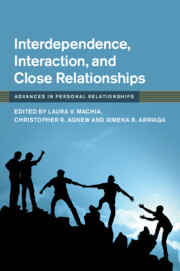Book contents
- Interdependence, Interaction, and Close Relationships
- Advances in Personal Relationships
- Interdependence, Interaction, and Close Relationships
- Copyright page
- Contents
- Figures
- Tables
- Contributors
- Acknowledgments
- Introduction
- Part I Interdependence, Situations, and Context
- Part II Interdependence, Security, and Risk
- Part III Interdependence, Goal Pursuit, and Person Factors
- Part IV Interdependence, Timing, and Expectations
- 13 Relationship Receptivity Theory
- 14 A New Measure of Expected Relationship Satisfaction, Alternatives, and Investment Supports an Expectations Model of Interdependence
- 15 Relationship Expectations about the Commitment to Wed
- 16 Creating Closeness and Interdependence
- Index
- References
13 - Relationship Receptivity Theory
Timing and Interdependent Relationships
from Part IV - Interdependence, Timing, and Expectations
Published online by Cambridge University Press: 19 June 2020
- Interdependence, Interaction, and Close Relationships
- Advances in Personal Relationships
- Interdependence, Interaction, and Close Relationships
- Copyright page
- Contents
- Figures
- Tables
- Contributors
- Acknowledgments
- Introduction
- Part I Interdependence, Situations, and Context
- Part II Interdependence, Security, and Risk
- Part III Interdependence, Goal Pursuit, and Person Factors
- Part IV Interdependence, Timing, and Expectations
- 13 Relationship Receptivity Theory
- 14 A New Measure of Expected Relationship Satisfaction, Alternatives, and Investment Supports an Expectations Model of Interdependence
- 15 Relationship Expectations about the Commitment to Wed
- 16 Creating Closeness and Interdependence
- Index
- References
Summary
As in all areas of life, timing matters in romantic relationships. At any given time and at various points throughout life, a person is more or less receptive to romantic involvement. Relationship receptivity theory centers on the proposition that perceived personal timing is consequential for relationship outcomes, including relationship initiation, maintenance, and stability. More specifically, at any given moment in life, a person can be said to be receptive to a relationship in so far as they a) want to be in a romantic relationship (termed relationship desirability) and b) feel ready to be in a romantic relationship (termed relationship readiness). These two key constructs, desire and readiness, can be in reference to a short-term relationship (e.g., as encapsulated in the desirability thought “I really want to be close to someone tonight”) or a long-term involvement (e.g., as encapsulated in the readiness thought “I’m ready to settle down”) and will wax and wane throughout the life course. This chapter introduces the theory and its major tenets, including a consideration of hypothesized antecedents and consequences of relationship receptivity. We posit that receptivity constructs are useful in understanding relational cognitions, emotions, motivations, and behaviors, and in predicting important relationship outcomes, among currently single people as well as among those currently involved in a romantic relationship. Future directions for research within the framework of the theory are also offered.
Keywords
- Type
- Chapter
- Information
- Interdependence, Interaction, and Close Relationships , pp. 269 - 292Publisher: Cambridge University PressPrint publication year: 2020
References
- 2
- Cited by

